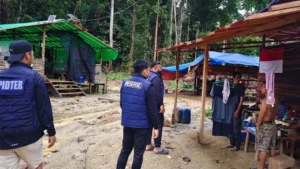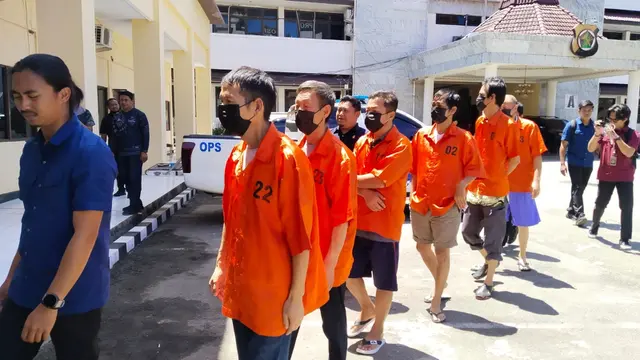The dense forests of Papua have long concealed untold natural riches, but in recent years they have also become the backdrop for illegal mining operations that threaten both the environment and local communities. On September 9, 2025, Indonesian police revealed a breakthrough: the arrest of six suspects, including four Chinese nationals, in an illegal gold mining case in Keerom Regency. The operation not only exposed the transnational nature of the crime but also underscored the government’s growing resolve to protect Papua’s ecological and economic integrity.
A Midnight Raid in Senggi: How the Case Unfolded
The case began in Kalipur Village, Senggi District, Keerom, a border region near Papua New Guinea that has often been outside the public eye. Acting on intelligence, officers from the Special Criminal Investigation Directorate (Ditreskrimsus) of Regional Police (Polda) of Papua raided a clandestine mining site where heavy machinery had been operating deep in the forest.
At the site, investigators discovered a Caterpillar PC 200 excavator carving through riverbeds, diesel engines humming, and rudimentary processing tools extracting gold dust from the soil. In total, police seized 257 grams of gold, a cache that symbolized both the greed driving the operation and the vulnerability of Papua’s resources when left unguarded.
The six individuals present were swiftly detained. Among them were four foreign nationals—later identified as CL (46), WCD (60), CHT (40), and CD (41)—all Chinese citizens who allegedly played key roles in financing and operating the illegal mine. The other two suspects, Indonesian citizens, were believed to act as translators, logistical coordinators, and local facilitators.
Within hours, the operation had transformed into a high-profile case with international dimensions. As Director of th Ditreskrimsus Polda Papua, Kombes Pol I Gusti Gede Era Adhinata explained, the group “failed to prove legal permits for their activities” and were found “operating with the intention of avoiding tax obligations.”

The Foreign Connection: Chinese Nationals in the Spotlight
The arrest of four Chinese nationals in Keerom sparked national attention, highlighting how illegal resource extraction in Papua is not only a local problem but part of a larger transnational network.
Investigators found that CHT appeared to act as an informal director and investor in the mining enterprise, while CD was directly overseeing day-to-day operations. The Indonesian suspect, LHS, reportedly functioned as a translator and payroll officer, ensuring smooth communication between local laborers and the Chinese operators.
This structure revealed a disturbing trend: foreign capital exploiting Papua’s natural wealth with the help of local middlemen, bypassing Indonesia’s regulatory framework, and depriving the state of legitimate revenue. The use of heavy machinery like the Caterpillar excavator further underlined the scale of the operation. This was no small artisanal effort—it was an organized, well-funded project designed for maximum extraction at minimal cost.
For locals, the optics were unsettling: foreign nationals “acting as if they owned the land,” while indigenous Papuans bore the ecological consequences.
Environmental Stakes: A Fragile Ecosystem Under Siege
Papua is home to one of the world’s most biodiverse rainforests, with rivers that sustain not only wildlife but also the livelihoods of indigenous communities. Illegal mining poses a triple threat: deforestation and land degradation caused by uncontrolled excavation; water pollution from the use of mercury and other chemicals in gold processing; and loss of biodiversity, as habitats are destroyed.
The site in Keerom was no exception. Police reported visible environmental damage from the heavy machinery. The excavator had gouged deep scars into the riverbanks, altering water flow and threatening downstream communities that rely on clean rivers for fishing and daily needs.
Experts warn that even after miners are removed, recovery is slow. River ecosystems can take decades to regenerate, and mercury contamination, if present, may linger for generations. The crackdown, therefore, was not only about stopping illegal economic activity—it was about preventing an ecological disaster before it became irreversible.
Echoes Across Papua: A Wider Campaign Against Illegal Mining
The Keerom arrests are part of a broader trend in Papua and West Papua, where police have been intensifying efforts against illegal mining. Only weeks earlier, in Manokwari and Pegunungan Arfak, authorities detained 31 illegal miners, confiscating 156 grams of gold, several excavators, diesel engines, and hoses. In another case in Masni, West Papua, heavy equipment and gold caches were similarly seized.
The pattern is clear: syndicates, often with foreign links, are targeting Papua’s gold reserves, leveraging local contacts and logistical loopholes to operate under the radar. But police, empowered by national directives, are increasingly moving to cut off these operations at the root.
As Papua Police Chief Inspector General Petrus Patrige Rudolf Renwarin has emphasized, the commitment is not just about law enforcement but about supporting President Prabowo Subianto’s broader agenda of sustainable development and environmental protection.
Community Perspective: Local Voices and Local Losses
For communities in Keerom, the mining raids have been both a relief and a revelation. Locals had long suspected unauthorized activities in remote forest patches, but the scale of the operations—complete with foreign investors and industrial machinery—was eye-opening.
Indigenous leaders have repeatedly stressed that illegal mining not only robs the land of its resources but also robs the people of their future. The influx of outsiders often leads to social tensions, while environmental damage undermines agriculture and traditional livelihoods.
“This land is not just soil and rivers—it is our history and our children’s inheritance,” one community elder in Senggi was quoted as saying. “If we lose it to outsiders, we lose everything.”
Legal Consequences: Sending a Strong Message
The six suspects now face charges under Indonesia’s Minerba Law (Law No. 3/2020 on Mineral and Coal Mining) and immigration regulations. If convicted, they could face years of imprisonment, hefty fines, and deportation for the foreign nationals.
Authorities have stressed that the case will be pursued with transparency, both as a deterrent and as a reaffirmation of Indonesia’s sovereignty over its resources. “We will not compromise,” officials have said, signaling that similar actors will face equally firm consequences.
Protecting the Local Economy: Why Enforcement Matters
Beyond the environmental concerns, illegal mining in Papua undermines the local economy. Licensed miners and cooperatives, many of them small-scale and community-based, cannot compete with the low-cost, high-output methods of illegal syndicates. Moreover, when foreign actors dominate, profits leave the region, offering little benefit to locals.
By removing unlicensed operators, the government protects economic sovereignty and ensures that any future mining—if permitted—can be conducted legally, with proper oversight, and with direct contributions to regional development funds.
Toward a Sustainable Future: Lessons from Keerom
The Keerom case highlights the urgent need for a holistic approach to resource management in Papua. Enforcement alone cannot solve the problem. Authorities, environmental NGOs, and local leaders stress the importance of:
- Strengthening community monitoring, empowering indigenous groups to report suspicious activities.
- Enhancing cross-border cooperation, especially with China, to prevent illegal investment networks.
- Investing in alternative livelihoods, so locals are not drawn into illegal mining as workers.
- Environmental restoration programs to rehabilitate degraded sites.
Only with these combined measures can Papua move toward a sustainable balance between resource use and environmental preservation.
Conclusion
The arrests in Keerom may mark a turning point in Papua’s struggle against illegal gold mining. For too long, shadowy networks have extracted wealth from the land while leaving destruction in their wake. Now, with decisive police action, the tide may be shifting.
The sight of four foreign nationals in custody, alongside their Indonesian counterparts, sends a powerful signal: Papua’s resources are not up for grabs. They belong to the people of Indonesia, and their stewardship demands vigilance, integrity, and justice.
As Papua stands at the crossroads of environmental protection and economic growth, the Keerom case offers a vivid reminder: protecting the land is not just a legal necessity—it is a moral duty to future generations.


